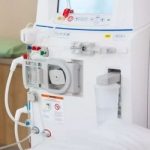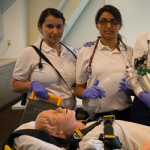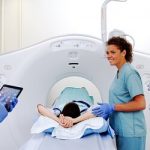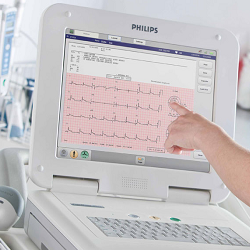What is an EKG Technician?
As an EKG Technician, you will listen to people’s heartbeats and record them over a period of time.
Hooking up the EKG machine is part of the job, and this machine measures the electrical activity in the patient’s heart.
An EKG Technician will listen to your heartbeat, record your heartbeat, and then decipher the meaning behind your heartbeats and any anomalies.
After inspection, the EKG Technician takes the report to the doctor who will then discuss it with the patient.
To be great at this job you must be willing to work with all types of people and have a solid knowledge of the medical field.
Duties
There are many duties to be done on a daily basis for an EKG Technician.
Some of the things that may be required in this career include:
- Hooking up and disassembling equipment
- Cleaning and sanitizing equipment
- Creating reports on data
- Observing tests
- Monitoring patients
- Talking to patients
- Responding to medical codes
- Talking to doctors
Salary
The average salary for an EKG Technician that works in the United States is around $60,570 a year.
Many EKG Technicians can make even more than that, over $98,070.
This can be done by earning certification, expanding your education, and possibly even going into specializations within the EKG community.
For EKG Technicians who are just beginning their career, $29,910 is a more likely salary.
People who work in larger populations will likely have higher salaries than those who work in small towns.
For example, EKG Technicians working in California can expect to make $76,000 a year, while EKG Technicians in Arkansas make $61,000 a year on average.
Annually National Average Salary: $72,890
Average Annual Salary by State
| State | Avg. Annual Salary |
|---|---|
| Alabama | $52,580 |
| Alaska | $95,020 |
| Arizona | $68,860 |
| Arkansas | $71,170 |
| California | $86,510 |
| Connecticut | $83,480 |
| Delaware | $72,710 |
| District of Columbia | $91,980 |
| Florida | $64,930 |
| Georgia | $73,920 |
| Hawaii | $91,070 |
| Idaho | $100,830 |
| Illinois | $71,370 |
| Indiana | $67,140 |
| Iowa | $68,370 |
| Kansas | $68,340 |
| Kentucky | $61,010 |
| Louisiana | $54,940 |
| Maine | $75,100 |
| Maryland | $77,000 |
| Massachusetts | $110,950 |
| Michigan | $70,170 |
| Minnesota | $70,910 |
| Mississippi | $51,620 |
| Missouri | $76,110 |
| Montana | $72,600 |
| Nebraska | $62,240 |
| Nevada | $66,850 |
| New Hampshire | $81,800 |
| New Jersey | $79,950 |
| New Mexico | $53,900 |
| New York | $84,180 |
| North Carolina | $63,690 |
| North Dakota | $69,690 |
| Ohio | $70,480 |
| Oklahoma | $58,450 |
| Oregon | $87,850 |
| Pennsylvania | $70,820 |
| Rhode Island | $93,520 |
| South Carolina | $62,690 |
| South Dakota | $70,020 |
| Tennessee | $64,270 |
| Texas | $59,000 |
| Utah | $94,430 |
| Vermont | $83,130 |
| Virginia | $82,180 |
| Washington | $87,690 |
| West Virginia | $46,930 |
| Wisconsin | $76,250 |
| Wyoming | $76,410 |
| Puerto Rico | $28,200 |
Annual Average Salary: Top 5 States
The top earning state in the field is Massachusetts, where the average salary is $110,950.
These are the top 5 earning states in the field:
* Employment conditions in your area may vary.
How to Become an EKG Technician
Step 1 Earn a Degree
Most employers require some type of degree in order to work as an EKG Technician.
This is because with a degree you can demonstrate that you know how to do the job and have the knowledge that goes with working in the medical field.
Earning an Associate’s degree in cardiovascular technology will lead you to a great career as an EKG Technician.
Most Associates degrees take about two years to complete.
Keep in mind that any program you get into should be accredited by the Commission on Accreditation of Allied Health Education Programs.
You should be able to find many cardiovascular technology programs that are accredited at your local community college or university.
There may even be some available online, which could even take less than two years to complete.
Some of the classes that you should expect in a cardiovascular technology program include:
- Anatomy and Physiology
- First Aid
- Medical Terminology
- Principles of Electrocardiography
- Microbiology
Earning an Associate’s degree can help with gaining employment in an entry-level position at hospitals or other medical facilities.
Step 2 Gain Experience
Now that you have a degree, you should start to look for a career.
Some of the places that you can find the experience as an EKG Technician include:
- Medical centers
- Laboratories
- Hospitals
- Doctor’s offices
- Clinics
If you are not ready to go full-out and get a job, another suggestion is to shadow an EKG Technician to see what their daily workday looks like.
You could also volunteer in a hospital or other medical center.
Obtaining hands-on experience in this field will take you far, the more knowledge you have about electrocardiography and the medical field in general, the higher chances of promotions and raises.
Before becoming certified, you should gain at least two years of experience as an EKG Technician so that you are well prepared for certification.
Step 3 Become Certified
Once you have a few years of experience in the field of EKG technology, then you may want to think about becoming certified.
This isn’t legally required anywhere in the United States yet, but it shows employers that you have competency in your career.
There are several certifications that an EKG Technician can obtain, including:
- Certified EKG Technician from the National Health Career Association
- Certified EKG Technician from the American Society of Phlebotomy Technicians
- ECG Technician from the American Certification Agency for Healthcare Professionals
Each certification has different requirements, but having an EKG Technician experience is a must for all.
In order to obtain these certifications, you must pass an exam.
After obtaining certification, you will stand out to employers and show that you have knowledge of your craft.
Step 4 Further Your Education
Whether you want to continue your career as an EKG Technician, or if you want to expand to something else in the medical field, having more education is not a bad idea.
Those who choose to earn a Bachelor’s degree will want to consider majoring in cardiopulmonary science.
If you already have an Associate’s degree, you may be able to transfer credits to speed up the process, but the typical Bachelor’s degree takes about four years to earn.
Some of the classes that you will take in a cardiopulmonary science program are:
- Pulmonary Pathology
- Cardiac Electrophysiology
- Patient Assessment
- Diagnostic Testing
There are other majors that could qualify for this career field.
Consider asking your employer before determining which major is right for you.
The other majors to consider are:
- Diagnostic Medical Sonography
- Cardiovascular Sonography
- Cardiovascular Technology
This is a great step into a more advanced career as an EKG Technician, or even to gain a promotion into a management position.
Popular Programs
Education
To obtain a career as an EKG Technician, you do not legally have to have a degree.
However, most employers require at least some type of education.
Many would agree that an Associate’s degree in cardiovascular technology is a good fit for this career.
On average, an Associate’s degree takes about two years to complete.
Within a cardiovascular technology program, you’ll learn many things about ultrasound technology and the cardiovascular system.
There will be many times where you will have to put your knowledge to practical use, and you’ll also take many classes on subjects like:
- Anatomy
- Pharmacology
- Cardiovascular technology practice
- Pathophysiology
- Clinical skills
It’s possible to earn an Associate’s degree as an EKG Technician online, but make sure that you also receive hands-on experience in the field while taking classes.
Earning an Associate’s degree will provide the chance to work in entry-level jobs in the medical field.
Having a Bachelor’s degree can heighten your chance of promotion, into more management types of roles in the cardiovascular field.
A Bachelor’s degree in cardiopulmonary science takes about four years to finish, however it’s possible that some of the Associate’s degree credits could transfer, making your education take less time.
This degree will take you deeper into the world of cardiovascular science, and explore topics such as:
- Patient Management
- Legal and Ethical Aspects of Healthcare
- Leadership
- Community Health
- Diagnosis and Intervention
After earning a Bachelor’s degree, there are so many career opportunities.
Some of them need further certification, but you could find your niche as a:
- Respiratory Therapist
- Cardiovascular Invasive Specialist
- Vascular Technologist
- Echocardiographer
The type of career you are looking for will decide which education level you need.
While gaining an education, it’s crucial to have hands-on experience as well.
You can do this by shadowing other EKG Technicians in order to see how they work and what the correct procedures are.
It’s possible to gain experience by volunteering in clinics or hospitals in your community.
The important part is to become as expert as you can in your field of interest.
Video About The Career
Certification
Certification is a great way to show an employer and patients that you know what you are doing as an EKG Technician.
Even though this isn’t a legal requirement, it’s still something that you should consider if you want to work in this profession.
There are several associations that provide certification for EKG Technicians.
The three biggest ones are:
- The National Health Career Association
- The American Certification Agency for Healthcare Professionals
- The American Society of Phlebotomy Technicians
The Certified EKG Technician from the Health Career Association certificate has one specific requirement, applicants must have completed education in the field within the last five years.
In order to obtain this certification, you must take an exam that costs $117.
This exam takes about three hours to finish and consists of multiple-choice questions.
Some of the areas to focus on for the exam include:
- Safety Compliance and Coordinated Patient Care
- EKG Acquisition
- EKG Analysis and Interpretation
You can expect to get your results in the mail between 6 to 8 weeks after taking the exam.
For the Certified EKG Technician certification from the American Society of Phlebotomy Technicians, (yes, it has the same name), you will need to have the following requirements:
- Be a current ASPT member
- Have proof of 5 documented EKGs by a supervisor
- Be a graduate of an accredited program
This exam costs $60 to apply for, and testing sites can be found across the United States, check your local hospital or community college.
For the other certification, the Certified ECG Technician from the American Certification Agency of Healthcare Professionals, you must have:
- At least six months of EKG recording experience
- Successful completion of an EKG program
This exam is given online through the ACAHP website, and more information about how to obtain this certification can be found there as well.
Certification Example:

Average Training Program Duration: 1-2 Years
Training to become an EKG Technician can take as little as six months, but be wary of short programs because they often don’t give out the education needed to begin an entry-level career.
Instead, opt for programs that are a year or longer, and that offer clinicals to get some hands-on experience in the field of EKG technology.
Those who are serious about becoming EKG Technicians will earn an Associate’s degree, this can typically take around two years to complete.
Certifications can take from six weeks to several months, depending on the certification.
Job Outlook
The career of an EKG Technician will be on the rise over the next ten years at a rate of about 5 percent.
Compared to other careers in the medical field, an EKG Technician should expect the most job opportunities.
This is due to the necessity of medical attention for the aging baby boomer generation.
As this generation ages, they will also retire which will provide more job opportunities for new EKG Technicians.
Those that have certifications or work in a specialized niche as an EKG Technician will likely find more career opportunities.
With advancements in machinery, more employers are requiring that EKG Technicians have advanced education in the field of technology as well.
Employment Growth Projection: 4%
2023
2033
That's a higher than average projected growth of 2,500
Should You Become an EKG Technician?
Overall Satisfaction: High

Most EKG Technicians love their careers, the only downfall is that there aren’t many opportunities for advancement.
This career is fast-paced, bet less stressful than most medical careers.
It doesn’t take too long to become an EKG Technician, only around two years, and can have great benefits as well as a good salary.
Those who gain more education will likely have more job prospects in this career, as well as opportunities for raises and promotions over those with no certifications.
The hours are decent and depending on the type of facility that you work in, you may not work forty hours a week.
This is good for some and hard for others, but this job can be very lucrative in the long run.
Average Salary: High

Most EKG Technicians in the United States make around $60,570 a year.
After several years of experience and earning certifications, many EKG Technicians can make over $98,070 in some areas.
Being specialized in a specific type of EKG can also provide a higher wage.
There are some EKG Technicians that are new to the career and should expect to make a salary closer to $29,910 a year to begin.
Working in a larger hospital or in an area with a higher population can lead to bigger salaries as well.
Job Growth Outlook: High

Having a career as an EKG Technician can be incredible, and it looks as if this career is on the rise.
Over the next decade, the job opportunities for EKG Technicians should grow by about 8 percent.
This is much higher than many other careers in the medical field.
There has been a bigger need for EKG Technicians over the last several years, and that will continue to grow due to the aging baby boomers.
As this generation gets older, they will need more medical care.
The rise in technology has also helped those who desire to work as an EKG Technician.
Education Duration: 1-2 Years

The duration of your education to become an EKG Technician depends on the facility that you want to work for.
Your employer can tell you whether they’d like you to earn an Associate’s degree or even just a certificate from a local community college.
If you require an Associate’s degree, this can take about two years to complete for full-time students.
However, there are many certification programs with varying lengths-from 6 weeks to 6 months or even a year.
Personal Skills Needed

Working as an EKG Technician can be difficult for those who don’t have knowledge in the medical field, but it’s important to have other characteristics as well.
In order to have a successful career as an EKG Technician, you should have:
- Physical stamina
- Understanding of EKG technology
- Good written and verbal communication skills
- Compassion and empathy
- Interpersonal skills
- Attention to detail
- Great observation skills
- Ability to work alone and with others
- Good bedside manner
Having a caring heart and a desire to help others will get you far in this career.
Frequently Asked Questions
What is the average salary for an EKG Technician?
Most EKG Technicians in the United States make about $60,570 a year.
Having a good education and certification can lead to a salary of over $98,070 for some EKG Technicians.
When you are just beginning your career, it’s better to expect a salary of around $29,910 to start.
Earning a degree, working toward certification, and even becoming specialized in a certain niche will grant you promotions and higher salaries in the long run.
How long does it take to become an EKG Technician?
The length of time it takes to become an EKG Technician is ultimately up to you.
There are many programs online and at community colleges or trade schools that teach EKG courses for a year to 18 months.
Most people who work as EKG Technicians earn an Associate’s degree, which takes about two years to finish.
After a couple of years of experience, you can become certified as an EKG Technician in a variety of areas.
All in all, it can take anywhere from 2-4 years to become a (Certified) EKG Technician.
What does an EKG Technician do?
An EKG Technician is a specialist who works with echocardiograms to determine the cardiovascular health of patients.
This can be done by performing tests on the patient, monitoring blood pressure, and collecting information to give to the doctors.
Some other tasks that you will likely have as an EKG Technician include:
- Sanitizing equipment
- Keeping patients comfortable
- Setting up components of equipment
- Monitoring equipment
In this career, it is required to work alongside many different doctors, nurses, and patients, so having great communication skills will get you far.
What is the demand for EKG Technicians?
There will always be a need for technicians in this world, especially those who work in the medical field.
With advanced technology, there are more possibilities to discover issues with the heart than ever, and this calls for more career opportunities as well.
Those who are interested in this career can expect it to grow around 8 percent over the next decade.
There shouldn’t be an issue gaining employment, especially as the baby boomer generation grows older, calling for more medical attention.
How much does it cost to become an EKG Technician?
Some programs that take about a year or so to finish can cost anywhere from $450 to $1,000 to complete.
On average, an Associate’s degree in the United States can cost about $15,000 to $20,000 to finish, depending on the type of school you enroll in.
Certifications can cost about $100 each, also depending on which certifications you choose.
All in all, it can take from $550 to over $20,500 to become an EKG Technician.
 EKG Technician Info by State
EKG Technician Info by State

- Alabama
- Alaska
- Arizona
- Arkansas
- California
- Colorado
- Connecticut
- Delaware
- Florida
- Georgia
- Hawaii
- Idaho
- Illinois
- Indiana
- Iowa
- Kansas
- Kentucky
- Louisiana
- Maine
- Maryland
- Massachusetts
- Michigan
- Minnesota
- Mississippi
- Missouri
- Montana
- Nebraska
- Nevada
- New Hampshire
- New Jersey
- New Mexico
- New York
- North Carolina
- North Dakota
- Ohio
- Oklahoma
- Oregon
- Pennsylvania
- Rhode Island
- South Carolina
- South Dakota
- Tennessee
- Texas
- Utah
- Vermont
- Virginia
- Washington
- West Virginia
- Wisconsin
- Wyoming
EKG Technician Resources
- 14 Pros and Cons of Being an EKG Technician
- 19 Reasons to Become an EKG Technician
- 4 Easy Ways to Find EKG Classes, Training, and Learning Resources
- 7 Key Skills Every EKG Technician Should Have
- Echocardiogram Cost: How Much Will It Cost You?
- Echocardiography and Electrocardiograph Technician Jobs
- EKG Certification
- How Much Does an EKG Technician Make an Hour?
- How Much Does EKG Technician School Cost?
- National EKG Certification Exam
- Online EKG Schools and Colleges
- Telemetry Certification
- Telemetry Technician Job Description
- Telemetry Technicians vs. EKG Technicians
- What is an EKG Technician?
More Medical Careers
| Career | |
|---|---|
 | Certified Nursing Assistant Working as a Certified Nursing Assistant is an entry-level role that will give you hands-on experience when you are ready to take the next step in your medical career. |
 | Dental Assistant Dental assistants help dentists to provide patient care, keep records, and care for the dental equipment. |
 | Dental Hygienist Dental hygienists take care of cleaning teeth to promote hygiene and help avoid cavities and gum problems. |
 | Dialysis Technician Dialysis technicians maintain and monitor dialysis equipment, and also act as primary caregivers for patients undergoing dialysis treatment. |
 | Dog Groomer Dog groomers attend to grooming dogs, usually at dog salons or big pet-related chain stores. |
 | Healthcare Administrator Healthcare administrators – also known as healthcare executives or health services managers – are responsible for the planning, direction, and coordination of medical and health services. |
 | Home Health Aide Home health aides provide home care to individuals who require assistance in their day-to-day living. |
 | Licensed Practical Nurse (LPN) Licensed Practical Nurses provide basic nursing care to patients and work with Registered Nurses and Doctors. |
 | Medical Assistant Medical assistants support the work of physicians, nurses, and other health professionals. |
 | Medical Biller and Coder Medical billers and coders manage, organize, and code various health information data. |
 | Medical Technologist Medical laboratory technologists collect bodily samples and conduct tests to analyze those samples. |
 | Medical Transcriptionist Medical transcriptionists go over voice recordings to convert them into written texts. |
 | Nutritionist As a Nutritionist, you’ll be tasked with creating meal plans, counseling, and understanding dietary restrictions for all types of clients. |
 | Patient Access Representative The work involves helping people to orient themselves to the space and everything that is going on. |
 | Patient Care Technician Patient care techs work directly with patients helping them with daily activities and assist the medical staff by measuring and monitoring the patients' vital signs among other tasks. |
 | Pharmacy Technician Pharmacy technicians provide patients with medications through prescription or over the counter. |
 | Phlebotomist As a Phlebotomist, it will be your responsibility to take blood samples from patients and send them to the lab for further testing. |
 | Physical Therapist Assistant Physical therapist assistants provide physical therapy services to patients and aide to physical therapists. |
 | Professional Recovery Coach A professional recovery coach is a life coach who works with someone during their addiction recovery process. |
 | Radiation Therapist Allied health provisional who specializes in radiation oncology treatments. |
 | Registered Health Information Technician Registered Health Information Technician (RHIT) help store and verify accuracy of health records as well as analyze patient data. |
 | Registered Nurse (RN) Registered Nurses provide hands-on patient care in various settings, mainly hospitals, and clinics. |
 | Respiratory Therapist Respiratory therapists treat and care for patients who experience breathing difficulties. |
 | Sterile Processing Technician A sterile processing technician is a healthcare professional who is responsible for preparing, sterilizing, maintaining, packaging, and storing medical tools and equipment used in surgical and other medical procedures. |
 | Surgical Technologist Surgical technologists – also known as operating room techs – prepare operating rooms and assist doctors and nurses during surgical procedures. |
 | Vet Office Manager Veterinary office managers work to make sure that the daily operations run smoothly and efficiently at veterinary hospitals or veterinary clinics. |
 | Veterinary Assistant Veterinary Assistants work closely with Veterinarians to handle routine animal care. |
 | Veterinary Technician Veterinary Technicians assist veterinarians as well as diagnosing and treating animals, mostly in private clinics. |
 | EMT Trained emergency medical technician that arrives at the scene to provide medical services such as resuscitation. |
 | MRI Technologist MRI Technologists use a machine to scan the body and create a detailed image of the inside for doctors to analyze. |
 | Optician Opticians are technicians and salespersons at the same time who spends most of their day talking to customers, reading prescriptions written by doctors, and dispensing glasses and lenses. |
 | Ultrasound Technician Ultrasound technicians aid physicians in monitoring and diagnosing patients through the use of ultrasonic imaging technology. |
 | X-Ray Technician X-Ray Technicians are medical imaging professionals who use technology to visualize the inside of our bodies. |














